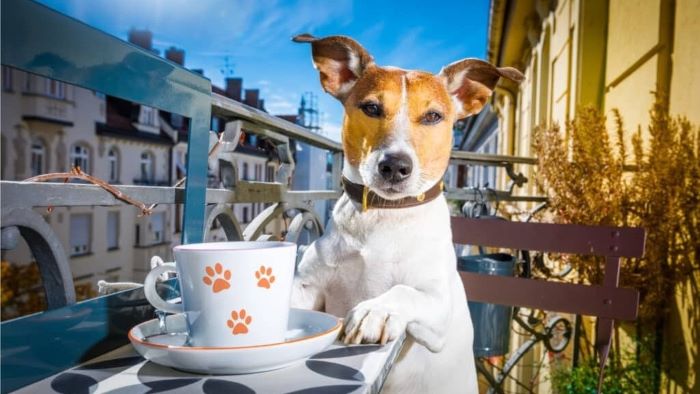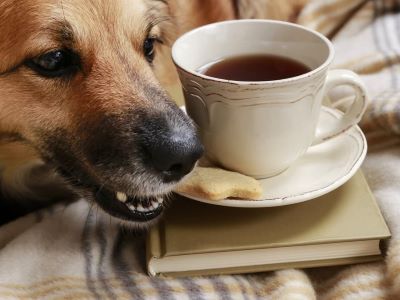It was a lazy sunny afternoon when Tilly decided to make a refreshing cup of tea. While Rio( her dog) kept running around her. After making tea Tilly started to wonder if is tea good for Rio. Can dogs drink tea?☕
In this blog, we are exactly going to strain the answer to this question. One of the most favourite beverages on the earth and can dogs enjoy it? So, without any further ado let’s begin!

Can Dogs Drink Tea?
The simple answer is, No! Dogs can not drink tea due to its caffeine content, caffeine affects the nervous system.
While humans may enjoy a cup of tea for health benefits, it’s important to note that dogs can have the negative effects of caffeine. Here are some common sources of caffeine found in our daily lives:
- Coffee is a well-known source of caffeine and should be kept away from dogs. Even small amounts of coffee grounds or brewed coffee can lead to caffeine toxicity in dogs.
- Tea, including black, green, white, and herbal teas, contains caffeine. While herbal teas may have lower caffeine levels, it’s safer to avoid giving any type of tea to dogs.☕
- Chocolate is another common household item that contains caffeine and theobromine, both of which are toxic to dogs. Dark chocolate has higher levels of these elements compared to milk chocolate.
- Energy drinks often have high caffeine content, and their consumption by dogs can result in caffeine toxicity. The added sugars and other elements in energy drinks can also be harmful.
- Dogs might be attracted to tea bags, which can pose a choking hazard, and the residual tea leaves can contain caffeine. Make sure to keep used tea bags out of your dog’s reach.

Why is Caffeine Harmful to Dogs?
Caffeine is dangerous for dogs. Their small size and different metabolisms make caffeine affect dogs more intensely than humans. When dogs consume caffeine, they can experience symptoms like restlessness, fast heart rate, shaking, and vomiting. Too much caffeine can even cause seizures or death.
All dogs react to caffeine differently. But it’s better to not let your dog have any caffeine at all. Keep coffee, tea☕, soda, chocolate🍫, and other sources of caffeine away from your dog.
If you think your dog ate or drank something with caffeine, call the vet right away. Getting treatment quickly is important for your dog’s health.
Always ask your vet before giving your dog new foods or drinks. They can tell you if human foods and beverages are safe for your dog. Your vet wants to ensure your dog stays happy and healthy.
Mechanism of Toxicity
Caffeine works as a stimulant by blocking adenosine in the brain. Adenosine makes you feel relaxed and sleepy. When it is blocked, other chemicals that stimulate the brain and body build up instead.
This makes humans feel more awake and alert.👀 But in dogs, caffeine has excessive effects. Their small size and different metabolism means the caffeine stays active longer. The stimulation is too strong for dogs. It can make their hearts race and make them shake or throw up.
So things like coffee, tea, soda and chocolate should not be given to dogs[1]. Their bodies handle the caffeine much more intensely compared to humans. Keeping dogs away from it is best.

Small dogs are more easily harmed by caffeine.☕ Their tiny bodies cannot handle as much. When a small dog eats or drinks caffeine, it gets a very high dose compared to a big dog.
All dogs are different in how caffeine affects them. Some small dogs get sick after having just a tiny bit. Others may be okay with more. Things like the dog's age, health, and breed make them more or less sensitive too. But it's always safer✅ to make sure little dogs never have any caffeine.
A small amount is like a large amount for them because their bodies are so tiny. Even a single coffee bean or piece of chocolate can make some tiny dogs very sick. So keep all foods and drinks with caffeine completely away from small dogs!
Symptoms of Caffeine Toxicity in Dogs
Here are the symptoms of caffeine toxicity in dogs at early and advanced stages:
Early Signs:
- Restlessness, Pacing, unable to settle down
- Fast heartbeat
- Muscle shaking or twitching
Advanced Symptoms:
- Vomiting – Can lead to dehydration
- High body temperature – Also causes dehydration
- Seizures – Dog has uncontrolled body movements from brain signals; emergency vet visit needed
- Collapsing – Caffeine has severely impacted organs
- Death (in extreme cases)
If you think your dog ate or drank caffeine, call your vet immediately.🧑⚕️
Inform them: What kind of caffeine it was (coffee, tea☕, chocolate, etc.), How much caffeine your dog had and Your dog's size and breed. Do not try to treat your dog yourself. Only the vet knows the right treatment.

Treatment Options
Here are the different treatment options for you to deal with the caffeine toxicity in your dog:
1. Inducing Vomiting
If you see your dog eat or drink caffeine, you have about 2 hours to act before the caffeine is absorbed. Within those 2 hours, your vet may recommend making your dog throw up. This gets the caffeine out of their body before it takes full effect.
But you should NEVER🚫 make your dog vomit without first calling your vet. Only do it if your vet says it is okay for your dog. There are some situations where making them vomit can be harmful.
So if your dog gets into caffeine, rush to contact your vet within 2 hours. Tell them exactly what happened right away. They will know if making your dog vomit or giving other treatment is best.
Time⌛ is crucial, so call them as soon as you notice your dog ate caffeine.
2. Activated Charcoal
Activated charcoal is an element that can help absorb toxins in the stomach before they are fully absorbed into the blood.
This can be a part of the treatment plan to lower further absorption of caffeine[2].
3. Supportive Care
Do NOT try home remedies instead of seeing a vet. Only vets know the right treatment for caffeine toxicity. Give your vet as much detail as possible, this helps determine the best treatment.
Follow all of your vet’s instructions for treatment, medications, and follow-up appointments closely. This gives your dog the best chance of full recovery.

4. Prevention
Being a responsible pet parent is the key here. Some very common human foods and drinks can be harmful to dogs so awareness is crucial.
As a pet parent, you must actively check ingredient labels for caffeine and other harmful toxins which may be present in that food. Coffee grounds, chocolate, pill bottles – all potential toxins must be kept securely out of paw’s reach.
FAQs
What Liquids Can Dogs Drink?
While water should always be the primary source of hydration for dogs, there are safe and healthy alternatives to explore. Bone broth, coconut water, herbal teas, goat’s milk, kefir, fruit and vegetable juices, Pedialyte, and homemade frozen treats can provide variety and additional hydration for your furry friends.
Can Dogs Drink Tea?
Dogs can’t drink tea due to its caffeine content. Caffeine is toxic to dogs and can cause many health issues – even decaffeinated tea contains small amounts of caffeine so it’s still not recommended. When it comes to drinks for dogs, fresh water is always the best and safest option.
Can I Give My Dog Tea or Coffee?
A lick or two of coffee (or even soda or tea) typically isn’t enough to cause poisoning in most pets. But if your dog ingests unused coffee grounds or beans or tea bags, it could cause serious toxicity. If you know your dog drank coffee or ate coffee grounds or beans, you need to monitor them for signs of toxicity.
Why Is My Dog Addicted to Tea?
They both contain caffeine which is a dangerous drug for an animal. Yes, they do like it sometimes and yes they can get addicted if given frequently. Regardless it is not good for your pet and you should be a responsible owner and not be offering drugs that are bad for your dog.
Can Tea Make a Dog Hyper?
Pets that consume caffeine may have an increased heart rate and become hyperactive. They get jittery and restless and do not want to lie still. They may also pace or vocalize excessively. “Caffeine also raises blood pressure and causes cardiac arrhythmias, which can be dangerous.”
Conclusion
In conclusion “Can dogs drink tea?” Caffeine can be extremely dangerous, even lethal, for dogs. So, tea is a big NO! Keep items that contain caffeine out of their reach.☕
Key signs of caffeine poisoning include restlessness, rapid heartbeat, vomiting, seizures, and collapse. And if you suspect caffeine poisoning then it quickly rushes to the vet, the quicker treatment begins, the greater the chances of recovery.
Don’t take chances with your dog’s safety. Stay alert.👀 Your dog’s life may depend on it!
Reference:



